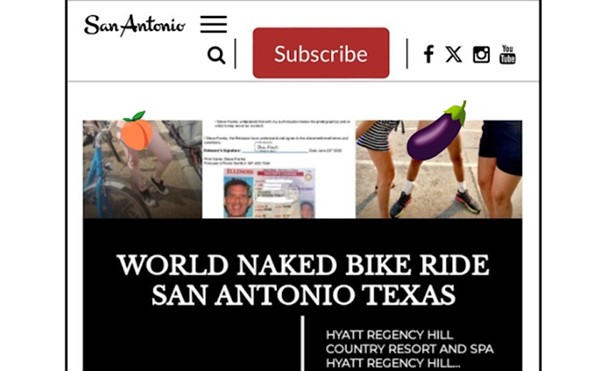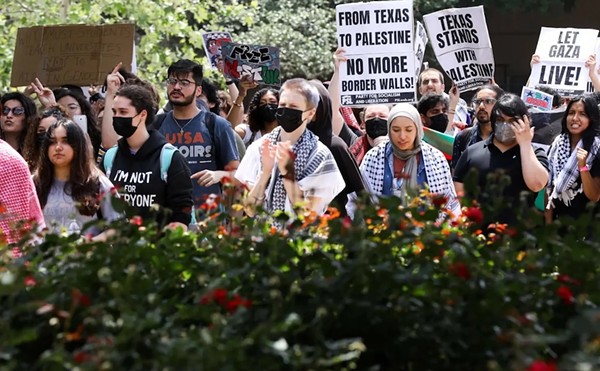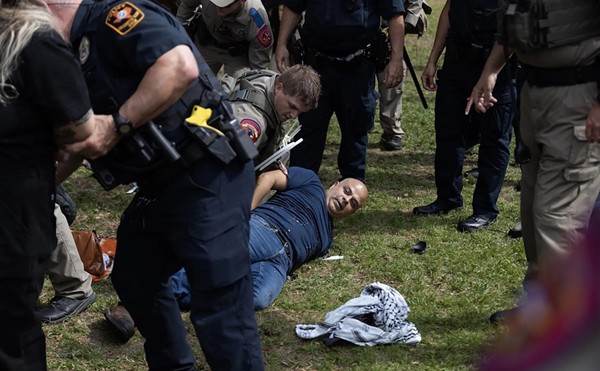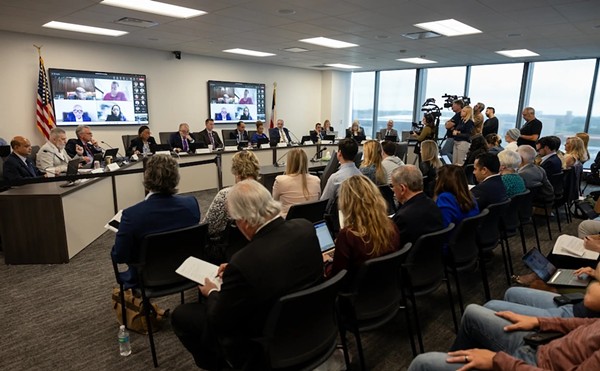The most compelling speaker at this year’s Democratic National Convention wasn’t standing in front of a podium. He didn’t have a packed arena or an overflow football stadium hanging on his every inflection. He only spoke for a couple of minutes, to an audience of about 100 people in a small meeting room at the Colorado Convention Center. But even on a DNC Youth Council panel featuring the star power of actress Kerry Washington, Black Eyed Pea will.i.am, and two of the youngest state legislators in the nation, Ephren Taylor stole the show.
A chunky, bespectacled, 26-year-old African-American real-estate and energy mogul from Mississippi, Taylor began building his wealth at the age of 12 by marketing his own 3D video games. During a Monday afternoon Youth Council discussion of what constitutes leadership, Taylor flew in the face of the carefully modulated responses from the rest of the panel, and let his youthful impatience show.
“I’m Generation I, from the internet, so my time frame and patience is that of a Google search result,” Taylor said. “True politics is citizens coming together and taking action. I’m tired of people coming to these caucuses and pontificating, and nothing ever gets done. … Let’s get it on. It’s time for action!”
The audience, much of which had been angling for cell-phone pictures of will.i.am only seconds earlier, rose in unison and gave Taylor a standing ovation.
Whatever one makes of Barack Obama the presidential candidate, the phenomenon of his candidacy stems from the kind of political fatigue that Taylor expressed. It’s part of the reason that his base and Hillary Clinton’s haven’t been easily transferable, even though these two Democratic titans share an overwhelming majority of policy positions. With this campaign, Obama took his community-organizer background and set out to create a bottom-up crusade. It’s an idea he expressed in his DNC acceptance speech this way: “Change doesn’t come from Washington; it comes to Washington.”
“The reality is that Obama looked at this as not just a campaign, but a movement, and he wants the people that come into this movement to stay in it,” says Judy Hall, an Obama delegate from San Antonio, and one of the driving forces behind his South Texas campaign. “The idea is: ‘I’m going to go to the White House, but if I don’t have support from the entire country, we’ll be in the same place we were in four years ago, eight years ago.’ So the way he’s developed this is that we’re going to teach people things that will help them in their community at the same time that they’re helping with the campaign. That’s radically different.”
The different flavor of the Obama movement — not to mention the fact that he’s the first African-American nominee of a major political party in this country’s history — lent the convention an air of history in the making, which partly explains why 84,000 people stood in the sweltering afternoon heat for up to three hours to see the candidate accept the nomination at Invesco Field. It also lent Obama — a pragmatic politician who has blatantly shifted to the political center since sewing up the Democratic nomination in early June — the aura of a mythic revolutionary hero. You couldn’t throw a rock in the Mile High City (not a good idea, by the way, in light of Denver’s amped-up security) without finding an “Obama Says Knock You Out” button or a T-shirt uniting him with the Rev. Martin Luther King Jr.
The Obama campaign couldn’t have picked a more perfect setting for its new-politics coming-out party than Denver, the biggest metropolitan area in a battleground state whose demographics appear to be shifting from red to blue; a city that embraces green-energy solutions, from its hybrid RTD buses to the free bicycle stations that popped up near downtown to reduce auto traffic (none too successfully, it should be noted); and a popular example of how a dormant downtown can be revitalized.
The Denver convention was like South By Southwest for politicos. Of course, it offered a daily slate of speeches in the Pepsi Center, the convention’s official home. But like SXSW, the convention had many faces because it was a magnet for every imaginable agenda, every kind of political statement, every marketable form of shameless American entrepreneurship, and a host of pleasure seekers looking to crash a late-night party or catch Fall Out Boy at a Rock the Vote concert.
Republican bikers rode across Lawrence Street holding up T-shirts with Obama’s likeness that said: “Not Ready 08: A Mile High, An Inch Deep.” James Donnelly came in from Asbury Park, New Jersey to sell dunce caps designed to “deprogram right-wingers.” John Stames, a tall, silver-haired Denver resident, paraded in front of the Convention Center in an Uncle Sam costume selling Laughing Hillary Pens, which produce a cackle so obnoxious not even the staunchest Hillary Clinton hater could vouch for their aural accuracy. Carlos Blanco made the trip from Austin to sell “Bushie Bye Bye” playing cards outside a downtown Starbucks (he generally peddles his wares on Austin’s 6th Street, outside the Lucky Lizard). And Kristen Hamill modeled and sold blue flip-flops with nine little Obama heads on them, an act of novelty capitalism that she explained as “Standing behind, and with, Barack Obama.” Even Claude Thompson, an elderly African-American man who shines shoes seven days a week at the corner of 16th Street Mall and Welton, buttressed his shoe-shine stand with an “Impeach Bush” sticker and loudly proclaimed to anyone hustling for a nearby shuttle bus: “Don’t vote for anyone with dirty shoes. Then you’ll wind up with George Bush.”
On Thursday morning, only a few hours before the fireworks-and-confetti blowout at Invesco, a small group of soft-spoken meditation advocates sat on the grass at Fishback Landing Park to provide “a place for quiet contemplation at the Democratic National Convention.” God knows, it was probably the only such place in downtown Denver all week.
La Bohéme Gentlemen’s Cabaret, a downtown topless bar, tried to capitalize on the week’s proceedings by suggesting you could debate the finer points of universal health care while receiving a lap dance. Their marquee boasted: “The Sexiest Democrats Who Ever Heard of a Nice Piece of Elephant.” Nearby, Shag Lounge invited dance-music aficionados to check out their “Discobama,” a sub-genre sure to supplant reggaeton as the next big thing.
You could find Spike Lee or Bill Richardson jostling their way through the crush of people on the convention floor, Jayne Seymour being led down the arena halls by an all-male entourage, and former Daily Show correspondent Mo Rocca shooting a Guam-obsessed video at the Pepsi Center’s You Tube station. Under the radar, you could also catch Political Karaoke, a Comedy for Choice festival, various underground art shows, and protests at designated parks, where neither the delegates nor the network news cameras would have to acknowledge them.
Oh, and the Democratic Party nominated a president.
One of the oddities of American presidential history is that watershed elections seem to happen, like clockwork, every 36 years. In 1860, the U.S. elected Abraham Lincoln, thereby hastening the Civil War; in 1896, the two major parties discovered the themes that would define them into the next century, with William McKinley championing big business and William Jennings Bryan taking the populist tack; in 1932, Franklin Roosevelt’s election in the middle of the Great Depression signaled nearly four decades of Democratic dominance; and in 1968, Richard Nixon’s narrow victory brought down the curtain on the Great Society and many of the social-welfare programs that had been taken for granted since the New Deal era.
Simple arithmetic suggested 2004 would be the next watershed election, and with support for the Iraq War eroding, many Democrats saw it as their chance to regain a popular majority. That didn’t happen, but the Dems’ big Congressional gains in 2006, and the massive turnout for this year’s Democratic primaries, hint that some kind of sea change may be imminent. So this year’s DNC carried a burden as well as an opportunity for its delegates: to unite a ruptured party or botch their shot at a political realignment — a shot that may not come again.
One of the most absurd theories propagated in the days leading up to the convention came from Dick Morris, Fox News contributor, former political advisor to Bill Clinton, and unabashed Clinton hater. Morris argued that Obama had allowed the Clintons to hijack the convention in a clear demonstration of his own weakness.
Morris based his contention on the fact that Hillary and Bill had the key prime-time speaking slots on the two middle nights of the convention. Certainly, it is unusual for a couple not affiliated with the presidential nominee to get such exposure. But Morris conveniently ignored how unusual the Clinton situation is to begin with. Bill Clinton is the only Democratic president to since FDR to win re-election, and Hillary Clinton not only ran one of the closest, most dogged runner-up races in primary history, she set new standards for women in presidential politics. How could either of these major Democratic figures be denied a prime-time slot?
Contrary to Morris’ theory, however, one of the striking facets of the convention from the opening gavel on Monday afternoon was how thoroughly Obama dominated the proceedings. Between speakers, delegates saw video snippets that told of his family history or his work as a community organizer in Chicago. And speaker after speaker touted all the wondrous changes that Obama’s presidency would bring — from a reduced dependence on foreign oil to well-funded public schools. In fact, until Hillary Clinton took the stage at the end of the convention’s second night, the most prominent reference to her or her husband came from Michelle Obama, who commended Hillary for providing a source of inspiration to young girls around the country.
With her opening-night speech, Michelle had as much to prove at the convention as her husband. Though widely lauded within the Obama campaign for her skills on the campaign trail, she’d been caricatured for months by conservative commentators as a bitter black woman who hates the United States.
Michelle managed to sell her personal story, from the death of her father to her marriage with Obama, without seeming manipulative. She did it less with words than with a manner that conveyed warmth, grace, and humility. Some in the viewing audience may have been surprised, but this was precisely the person Judy Hall observed at an early fundraising event with Michelle in Dallas.
“She always asks for children to be invited,” Hall says. “She will go out of her way to make sure that charter schools and Head-Start type of situations are part of whatever she does, to act as a mentor. One of the gals who was running it wanted to take a picture of her with the kids. I had a camera, so they asked me to take it.”
Trying to corral 60 young girls in a hotel lobby and not knowing when Michelle would join them, Hall suggested that they bide their time by singing. A child in the back suggested the “Star Spangled Banner.” “They were singing at the top of their lungs and it was really beautiful,” Hall recalls. “From the side, I see Michelle come out. They couldn’t see her, but I could. She stopped dead still and started singing the ‘Star Spangled Banner,’ tears streaming down her face. She waits for them to finish completely and gives a speech just to them.”
Hall’s roots in politics very nearly extend back to the womb. She grew up in Galveston across the street from legendary State Senator A.R. “Babe” Schwartz, and says she was a “baby activist.” She’s worked in clinical counseling for 25 years, and in the late 1990s, she became involved in Democratic Party politics. She served as a Texas delegate at the 2004 Boston convention, when a then-unknown Illinois state senator named Barack Obama delivered the keynote address. “My impression at that time was, ‘This is a leader we need, and I hope to God that this man will choose to run,’” Hall recalls. “Individually, I can’t imagine anyone choosing to run for office at that level, because you give up every little tiny morsel of privacy for yourself and your family. But I was instantly struck with that.”
Elise Boyan, Hall’s roommate at the 2008 DNC, has a perspective on Obama that few of her fellow delegates can share. A 1991 graduate of Harvard Law School, Boyan was one of Obama’s classmates. “We weren’t close friends or anything, but I knew him,” she says. “He was an amazing student. He was probably one of the most recognized people on our class and on campus, in general. He was a leader then, he was the editor of the law review, so he held the most distinguished position in the student body. He was friendly, outgoing smart.
“He was one of those people that inspires enough admiration that your envy of him is outbalanced. We were in the same Constitutional Law class, a big survey class. I remember distinctly that he sat in the front, and I sat in the back. He talked a lot more than I did. You were grateful for him, and you admired him, but you sometimes thought, ‘Jeez, Barack.’ But it was all good.”
While Obama supporters were basking in the glow of Michelle’s acclaimed spotlight performance, hints of trouble began to emerge from Hillary supporters. On Monday night, the Republican National Committee hosted a “Happy Hour for Hillary” at the Paramount Café and at least 100 Hillary diehards showed up. Tuesday morning, disaffected Hillary backers organized a two-mile march to the Pepsi Center, while grandstanding attorney Gloria Allred grabbed headlines by wrapping a red bandana around her mouth when she wasn’t allowed to speak at the California delegation’s Tuesday-morning breakfast.
That afternoon at an open-air Women Count gathering, Adita Blanco, an Edmond, Oklahoma resident in a camouflage pro-Hillary T-shirt with the message “Country Before Party,” explained why she could never vote for Obama. She argued that the press was blatantly sexist toward Hillary and failed to vet Obama. She also refuted any suggestion that Obama had to deal with racial bias comparable to the gender bias Hillary faced.
“He used the race card totally in his favor,” a seething Blanco said. “He called the Clintons racist, when there’s not a racist bone in their bodies. I mean, they used to call Bill Clinton ‘the first black president.’ Obama basically trashed Clinton’s presidency. And what do you like about the Clinton years? The peace or the prosperity? He made some mistakes, but they didn’t affect you and me.”
Blanco, like most of the scorched-earth, Hillary-supporting refuseniks I encountered, was not a delegate to the convention, but I did meet three female Clinton delegates from Houston who shared much of Blanco’s bitterness. They complained that Democratic Party chairman Howard Dean never spoke up to decry media sexism and that Obama didn’t seriously consider Hillary for VP.
The phenomenon of PUMA (Party Unity, My Ass) and other Hillary-or-bust organizations became particularly bewildering at the convention because of the great lengths that Hillary went to in Denver to push for Obama’s election. But her deepest loyalists seemed to be saying, “We love you so much, we refuse to follow your advice.”
One staunch Hillary supporter who did accept her defeat was San Antonio delegate Larry Romo, a 28-year Air Force veteran now employed by the Army in civil service. “I still wish that Hillary was a candidate, but being the good Democrat that I am, Barack Obama is definitely a better candidate than John McCain on the issues that are important to me, like health care and the treatment of veterans,” Romo says. “What’s good about the Barack Obama people, though, is they outreached to me, and said we’d like you to be the Southwest Regional Coordinator of Veterans for Obama.”
Tuesday night, on the 88th anniversary of women receiving the right to vote in the U.S., Hillary made the case against McCain, but she did so without delving into Obama’s own personal credentials. Her most persuasive moment came when she asked supporters if their support was “just for me,” or connected to a bigger cause. In essence, it was a reminder that cult-of-personality devotion had no place in an election year when America is confronting a sagging economy and a dizzying array of international challenges.
On Wednesday afternoon, Hillary hosted a “thank you” rally at a Convention Center ballroom, calling the campaign “a joy,” and informing her delegates that she was releasing them to vote as they wished. Some loyalists in the room booed, but she explained that if they felt strongly about voting for her, she accepted that (although she noted that she’d already voted that morning for Obama).
One of Hillary’s most passionate San Antonio supporters, State Senator Leticia Van de Putte, chaired Wednesday’s convention night and appealed for party unity at a brief afternoon appearance in front of the Hispanic caucus. “It’s not about us, it’s about nuestros hijos,” Van de Putte urged with characteristic vehemence.
Among other things, the Hispanic Caucus gathering countered the myth that Obama hasn’t connected with Latinos. According to a recent Pew Research poll, he’s drawing 66 percent of the Latino vote, to 23 percent for McCain (by comparison, John Kerry beat George W. Bush in 2004 by only 62-35). And Obama has only begun his big media push in the Latino community, which will likely include on-air interviews with popular Spanish-language DJs such El Pistolero and El Cucuy.
On Wednesday night, Bill Clinton — widely reported to be nursing intense grievances against the Obama campaign — defied expectations and offered considerable praise for Obama’s ability to inspire. When he boomed, “Barack Obama is ready to be president of the United States,” the Pepsi Center nearly shook with partisan euphoria.
Less than two hours later, Obama returned the favor when he made a surprise cameo onstage to congratulate running-mate Joe Biden on his speech. He playfully said that Hillary had “rocked the house” on Tuesday night and praised Bill Clinton for reminding the country what it’s like “to have a president who puts people first.”
When Clinton beamed and mouthed a “thank you” from his club-level box, it seemed that at last the party’s power players had agreed to bury the hatchet — in John McCain.
Words cannot adequately express how overwhelming the lines were outside Invesco Field on Thursday afternoon. I arrived at 3 p.m. Mountain Time (more than five hours before Obama began his speech) and within 10 minutes, it looked like the line had grown a mile longer.
Obama’s decision to move the final night to Invesco created a host of logistical nightmares for Denver. I-25, the city’s major highway, had to be shut down for four hours. The bus route for delegates was longer and more complex than a ride to Pepsi Center, and the security demands were five times greater than at the arena. Network news divisions had to dismantle their sets and move them to a new venue. Not to mention the possibility that bad weather could wash out the proceedings.
The stadium gambit also carried serious political risks. Obama has already demonstrated his ability to draw a crowd, whether in Philadelphia or Berlin. That star power has been ridiculed by the McCain camp as proof that he’s a smooth-talking, but empty, celebrity. The Invesco speech played into that criticism, and sacrificed some of the intimacy so crucial when you’re trying to reach viewers in their living rooms.
The great irony of Obama’s campaign is that his skillful use of rhetoric has enabled him to connect with voters like Ephren Taylor, people who can no longer stomach political rhetoric. That level of devotion has fueled his youth-driven grassroots organization, unprecedented fundraising machine, and crowds like the one that filled Invesco. It inspired San Antonian Gretchen Lewis to make two trips to her native Pennsylvania in early spring with her soon-to-be-18-year-old son, Sam, to help the campaign effort there. She registered voters, entered data, and, on her second trip, visited 1,100 homes in two days.
When you raise expectations that high, you’ve got a long way to fall, and the greatest political danger for Obama this fall (greater even than the uncertain Hillary bloc) is that by moving too eagerly to the center, he’ll dampen the enthusiasm of his true believers. Coming on the heels of a summer in which he reversed himself (or at least pivoted) on the FISA bill, Washington, D.C.’s handgun ban, the death penalty, offshore oil drilling, and public funding of the presidential election, his acceptance speech needed to reassure potential doubters that, to paraphrase Smokey Robinson, the love they saw in him was not just a mirage.
When Obama sauntered to the podium at Invesco’s 50-yard-line, with a backdrop of Greek columns and false windows that looked uncannily like the exterior of the White House, he exuded easy confidence. Focused and unusually feisty, he delivered what he’d billed as a “workmanlike” speech, shorn of most of his usual poetic flights. When he went after McCain on national security — “John McCain likes to say that he’ll follow bin Laden to the Gates of Hell, but he won’t even go to the cave where he lives” — writers in the press box gasped with disbelief.
It was a cheap shot, based on the assumption that McCain knows where bin Laden is hiding (or that he currently has the power to do anything about it), but it met with a chorus of foot-pounding thunder at Invesco. Obama’s best moments, however, came when he connected his movement to the broader sweep of historical forces, as John Kennedy did in his 1960 “New Frontier” speech: “America, now is not the time for small plans”; “at this moment, in this election, we must pledge once more to march into the future.”
Generational shifts in American politics rarely happen without great resistance. John Kennedy, for all his ballyhooed charisma, won by the narrowest of popular and electoral margins in 1960. And Bill Clinton might not have cruised to victory in 1992 if Ross Perot hadn’t been around to steal votes from George H.W. Bush. Obama has no such subversive help (Bob Barr doesn’t count) and as political analyst Howard Fineman said at a Convention Center book signing: “It’s either going to be really close or, in the end, the bottom will drop out for McCain.”
After Obama’s speech, as waves of humanity shuffled out of Invesco Field’s west entrance, a tall, red-headed, hippie-looking guy stood near a T-shirt stand and held up a red-and-white “Ron Paul for Liberty” placard. “He’s not done,” the man assured us, to little apparent interest from the pedestrians. “Ron Paul has a plan.”
It was a final DNC reminder that political dreams die hard. Democrats surely know that lesson. •

















